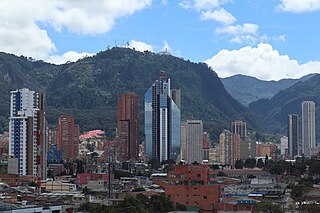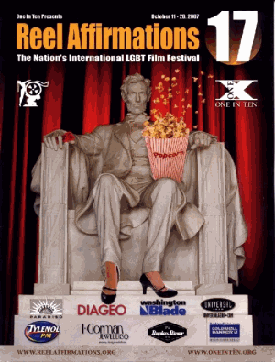
The American Film Institute (AFI) is an American nonprofit film organization that educates filmmakers and honors the heritage of the motion picture arts in the United States. AFI is supported by private funding and public membership fees.

Washington, D.C., formally the District of Columbia and commonly called Washington or D.C., is the capital city and the federal district of the United States. The city is located on the east bank of the Potomac River, which forms its southwestern border with Virginia and borders Maryland to its north and east. Washington, D.C. was named for George Washington, a Founding Father, victorious commanding general of the Continental Army in the American Revolutionary War and the first president of the United States, who is widely considered the "Father of his country". The district is named for Columbia, the female personification of the nation.

Bogotá, officially Bogotá, Distrito Capital, abbreviated Bogotá, D.C., and formerly known as Santa Fe de Bogotá during the Spanish Colonial period and between 1991 and 2000, is the capital city of Colombia, and one of the largest cities in the world. The city is administered as the Capital District, as well as the capital of, though not part of, the surrounding department of Cundinamarca. Bogotá is a territorial entity of the first order, with the same administrative status as the departments of Colombia. It is the main political, economic, administrative, industrial, cultural, airport, technological, scientific, healthcare and educational center of the country and northern South America.

The Hawai'i International Film Festival (HIFF) is an annual film festival held in the United States state of Hawaii.

The Seattle Cinerama Theatre is a landmark movie theater in the Belltown neighborhood of Seattle, Washington, United States. The theater opened in 1963 and was renovated in the 1990s after its acquisition by Paul Allen. The Cinerama was closed in May 2020. At the time of its 2020 closure, it was one of only three movie theaters in the world capable of showing three-panel Cinerama films. In 2023, the theater was purchased by the Seattle International Film Festival and is scheduled to reopen as SIFF Cinema Downtown due to trademark issues with the "Cinerama" name.

The Cyrus and Myrtle Katzen Arts Center is home to all of the visual and performing arts programs at American University and the American University Museum It is located at Ward Circle, the intersection of Nebraska Avenue and Massachusetts Avenues in Washington, D.C. This 130,000-square-foot (12,000 m2) space, designed to foster interdisciplinary collaboration in the arts, provides instructional, exhibition, and performance space for all the arts disciplines. Its 30,000-square-foot (3,000 m2) art museum exhibits contemporary art from the nation's capital region and the world. The museum gallery is the Washington region's largest university facility for art exhibition.

The Uptown Theater, known as The Uptown, was a single-screen movie theater in the Cleveland Park neighborhood of Washington, D.C. Opened in 1936, it hosted the world premieres of such movies as 2001: A Space Odyssey and Jurassic Park. It closed in March 2020.

The DEFA Film Library at the University of Massachusetts Amherst is the only research center and archive outside of Germany devoted to a broad spectrum of filmmaking from and related to the former German Democratic Republic. Researchers are welcome to the archive by pre-arranging their visit.
The culture of Washington, D.C. is reflected in its status as the capital of the United States and the presence of the federal government, its large Black population, and its role as the largest city in the Chesapeake Bay region. The presence of the U.S. federal government, in particular, has been instrumental in developing numerous cultural institutions throughout the city, such as museums and performing arts centers. The city's historic Black population has also helped drive cultural activities and artistic pursuits. During the early 20th century, for example, Washington's U Street Corridor became an important center for African American culture.

The culture of San Antonio reflects the history and culture of one of the state's oldest and largest cities straddling the regional and cultural divide between South and Central Texas. Historically, San Antonio culture comes from a blend of Central Texas and South Texas (Southwestern) culture. Founded as a Spanish outpost and the first civil settlement in Texas, San Antonio is heavily influenced by Mexican American culture due to Texas formerly being part of Mexico and, previously, the Spanish Empire. The city also has significant German, Anglo, and African American cultural influences. San Antonio offers a host of cultural institutions, events, restaurants and nightlife in South Texas for both residents and visitors alike.

Brian Skerry is an American photojournalist and film producer specializing in marine life and ocean environments. Since 1998 he has been a contributing photographer for National Geographic magazine with more than 30 stories to his credit, including 6 covers. In 2021 Skerry won a Primetime Emmy Award for his role as producer in the miniseries, Secrets of the Whales.

Reel Affirmations (RA) is a non-profit, all-volunteer LGBT film festival in Washington, D.C. Founded in 1991 and held every year in mid-October, as of 2011 Reel Affirmations was one of the largest LGBT film festivals in the United States. Baltimore's Gay Life newspaper called it "one of the top three films festivals for the entire LGBT community." A 2007 guidebook claims it was one of the largest LGBT film festivals in the world. A listing of LGBT film festivals claims it is the largest all-volunteer film festival in the world.
The Silk Screen Asian American Film Festival was a 10-day film festival held annually in Pittsburgh, Pennsylvania to show the most recent films and music by artists with Asian ethnic origins, such as from Japan, China, Taiwan, India, Pakistan, Indonesia, Korea, Turkey, the Philippines, and The Middle East. It also included films whose topical matter is about Asians or Asian Americans.

The Sundance Film Festival is an annual film festival organized by the Sundance Institute. It is the largest independent film festival in the United States, with more than 46,660 attending in 2016. It takes place each January in Park City, Utah; Salt Lake City, Utah; and at the Sundance Resort, and acts as a showcase for new work from American and international independent filmmakers. The festival consists of competitive sections for American and international dramatic and documentary films, both feature films and short films, and a group of out-of-competition sections, including NEXT, New Frontier, Spotlight, Midnight, Sundance Kids, From the Collection, Premieres, and Documentary Premieres. Many films premiering at Sundance have gone on to be nominated and win Oscars such as Best Picture, Best Director and Best Actor in a Leading Role.

The Edlavitch Jewish Community Center of Washington, D.C. is a Jewish Community Center located in the historic district of Dupont Circle. It serves the Washington, D.C. area through religious, cultural, educational, social, and sport center programs open to the public, although many programs are strongly linked to Jewish culture, both in the United States and in Israel. It is part of the JCC Association (JCCA), the umbrella organization for the Jewish Community Center movement, which includes more than 350 JCCs, YM-YWHAs, and camp sites in the U.S. and Canada, in addition to 180 local JCCs in the Former Soviet Union, 70 in Latin America, 50 in Europe, and close to 500 smaller centers in Israel.

The San Francisco Green Film Festival was an environmental film festival which was held annually from 2011 to 2019.

The Embassy of Slovenia in Washington, D.C. is the Republic of Slovenia's diplomatic mission to the United States. The embassy in Washington is also responsible for representing Slovenia in Mexico. The chancery is located just off Embassy Row at 2410 California Street NW in the Kalorama neighborhood. Consular assistance is also provided by Slovenia's network of consulates in the U.S. and Mexico.
The DC Shorts Film Festival is an annual film festival held in Washington, D.C.
The South East European Film Festival, also known as SEEfest, is an annual (non-profit) film festival held during the first week of May in various venues throughout Los Angeles, California. The festival presents feature films, documentaries and shorts produced in or thematically related to South East Europe and the Caucasus.

The United Nations Association Film Festival (UNAFF) is an international documentary film festival. It was founded by Jasmina Bojic, a Stanford educator and film critic, in 1998 to honor the 50th anniversary of the Universal Declaration of Human Rights. The festival showcases documentaries related to human rights and social issues/solutions and holds discussion forums with experts on the topics.















